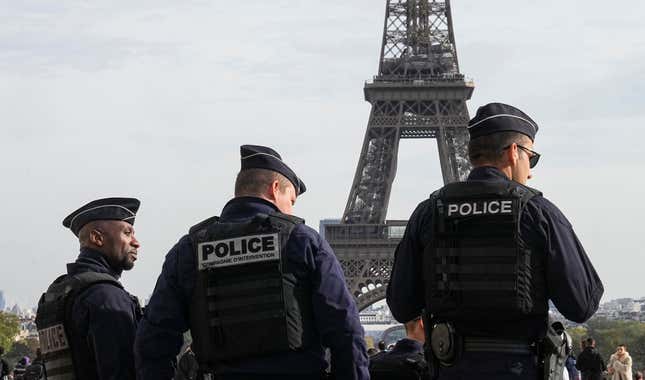
PARIS (AP) — The sumptuous Palace of Versailles was forced to evacuate visitors for the fourth time in less than a week for a security check after a bomb alert. Airports and schools around France also fell victim to bomb alerts and forced evacuations after similar warnings a day earlier. Even a nuclear research institute received a threat Thursday.
Pranksters or plotters?
No bombs have been found, but authorities can’t take risks with the lives of travelers, students or workers. Still, the government is growing impatient, threatening prison terms and heavy fines for those making fake bomb threats. A rash of false alarms forced the evacuation of 15 airports and cancellation of 130 flights, as well as shutting the doors to the Palace of Versailles repeatedly since last Saturday.
Interior Minister Gerald Darmanin said Thursday evening that 18 people had been detained in the last 48 hours — mostly, but not only, minors.
The barrage of alerts “disorganizes our security services and obviously stops society from functioning,” Darmanin said in an interview with BFM-TV. False alerts also “pose an enormous risk in case of a (real) problem.”
The minister said that “enormous means” are being used to identify pranksters with their phone numbers and addresses.
“We tell those listening: We will find everyone,” he said.
Justice Minister Eric Dupond-Moretti blamed the alerts on “little jokers, little clowns" and warned of the consequences.
Under French law, prank calls can be punished with up to 3 years' imprisonment and fines of 45,000 euros ($47,000), the minister said. The justice minister said minors' parents could be made to pay for damages, while the interior minister said that student pranksters won't get off the hook: their names and phone numbers will be transmitted to the National Education system.
“We don't need this. We don't need troublemakers, psychosis, at this moment,” the justice minister said Wednesday.
Police said that at least seven airports received threats on Thursday, mainly by email. Among those targeted were airports at Lille, Lyon, Bordeaux, Nantes and Toulouse.
France has been on heightened alert since the fatal stabbing of a schoolteacher last week that was blamed on a suspected Islamic extremist who allegedly declared allegiance to the Islamic State group.
A funeral service for Dominique Bernard, the French-language teacher killed by a knife wound to the neck, was held Thursday in Arras, the northern town where he taught at the Gambetta-Carnot school. President Emmanuel Macron was in attendance — his plane on the tarmac of nearby Lille airport, among those evacuated during the morning service, according to the local Voix du Nord newspaper.
Among threats received Thursday was one at a nuclear research facility in Grenoble, in the southeast. Two delivery men, aged 23 and 26, were arrested after leaving a package at the Laue Langevin Institute and telling guards as they left, “We did it. We delivered a bomb,” the local Le Dauphine Libere reported.
French Transport Minister Clement Beaune said false threats were made against 17 airports on Wednesday, causing widespread disruption, the evacuation of 15 airports, cancellation of 130 flights and many flight delays.
It is the regional prefects who decide, on a case-by-case basis, whether threats necessitate an evacuation.
“For the moment, we have no miracle solution,” said Nicolas Paulissen, general delegate for the Union of French Airports which is present at all 150 airports around the country. The bomb risk cannot be ignored, but “we can't stop airports from functioning.”
He noted, however, that airports are capable of adapting to threats and crises.
“Adaptation is in our DNA,” Paulissen said.
Beaune, the transport minister, underscored the government's firm message about the barrage of bomb alerts.
“These false alerts are not bad jokes. They are crimes,” Beaune posted on X, formerly known as Twitter.
___
AP journalist John Leicester contributed to this report.